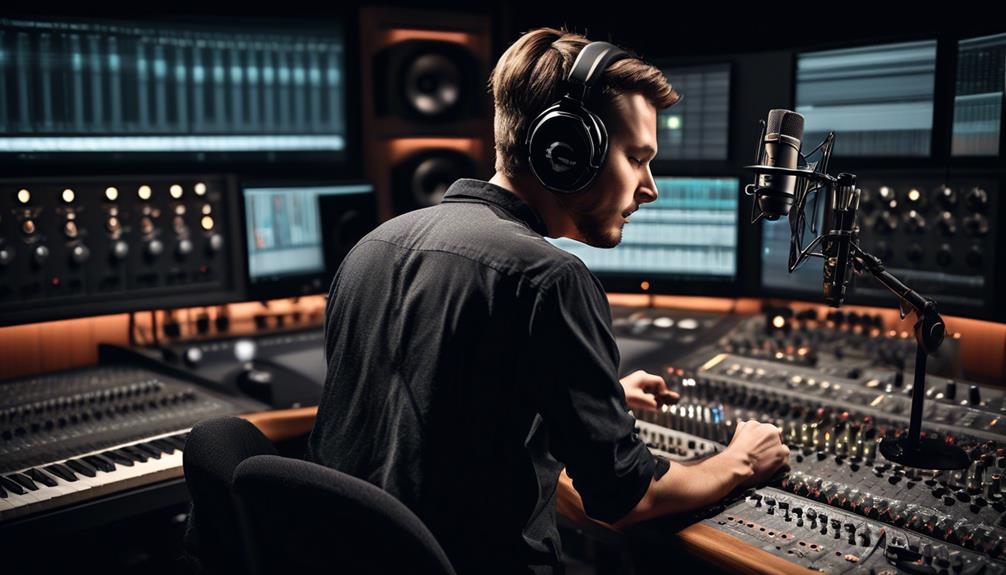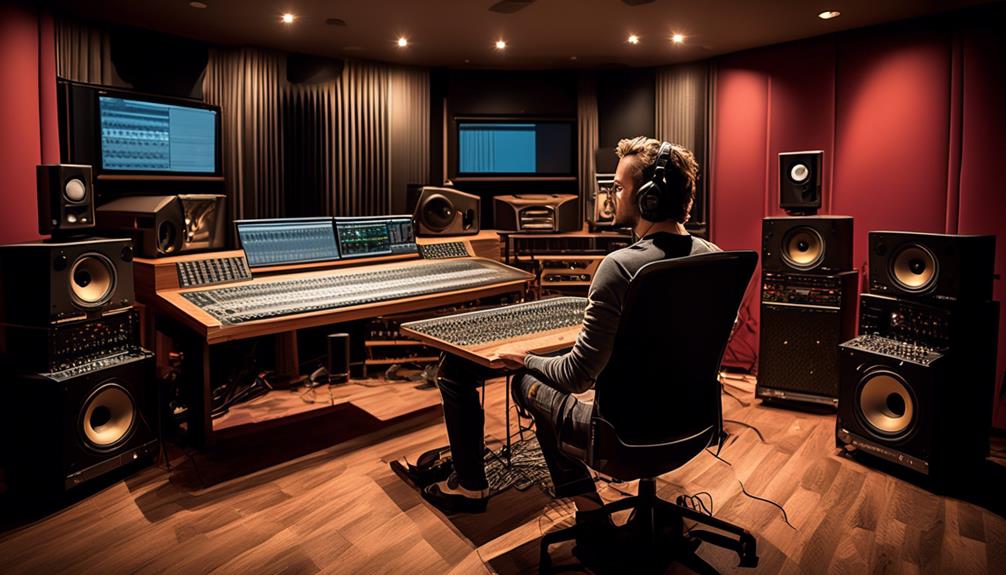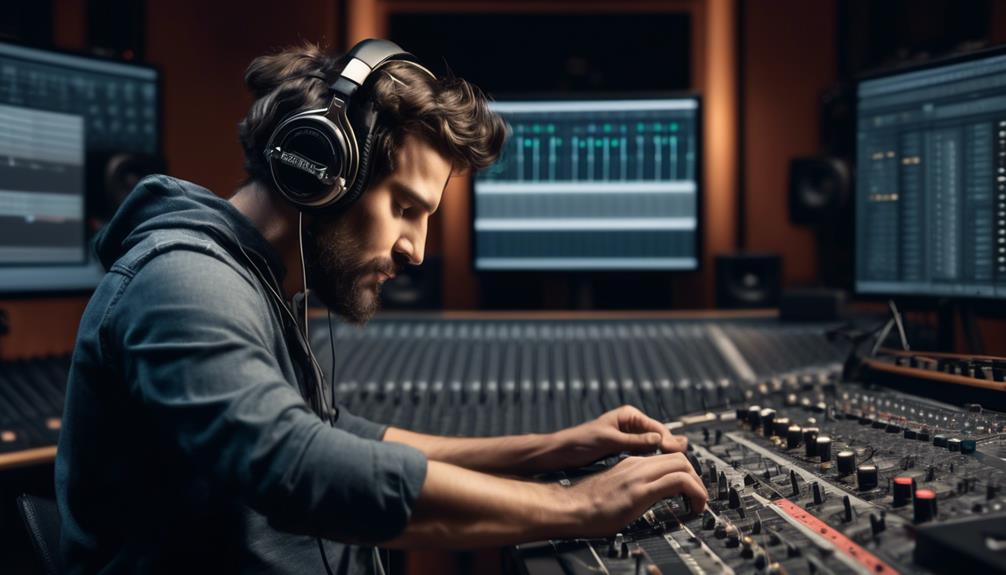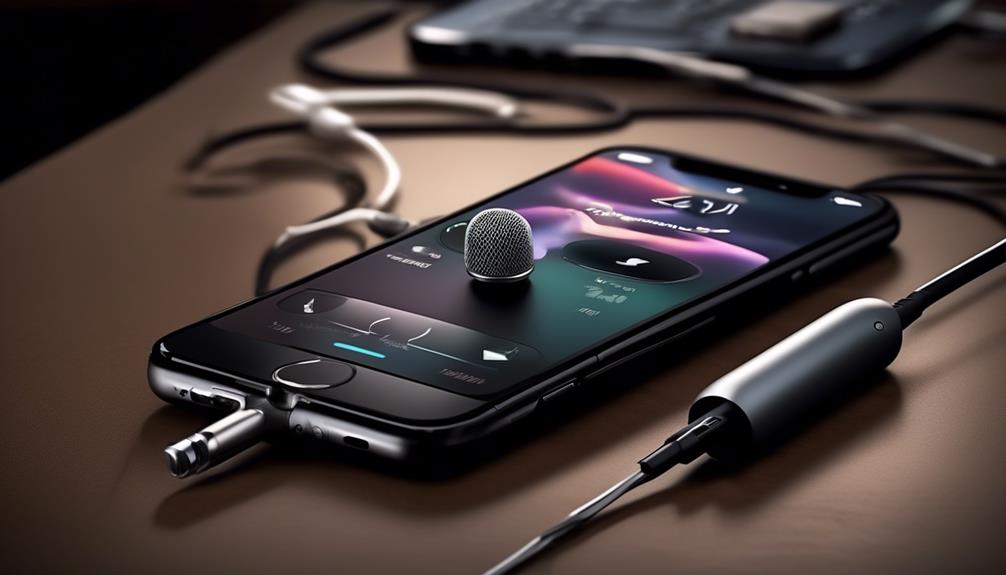Aspiring recording engineers often find themselves deeply involved in the realm of audio production. However, what many may not fully grasp is the breadth and variety of responsibilities that recording engineers handle.
From setting up microphones to meticulously editing and weaving recorded components together, their role is crucial in shaping the final sound of a recording.
However, there's much more to uncover about the skills, responsibilities, and impact of recording engineers in various industries.
Let's explore the multifaceted world of recording engineering and what it truly means to be a recording engineer.
Key Takeaways
- Recording engineers are responsible for managing the technical and aesthetic aspects of recording sessions and ensuring the overall sound quality of recorded tracks.
- They collaborate with clients and artists to understand and fulfill their expectations, requiring strong interpersonal and collaboration skills.
- Technical proficiency in digital recording equipment and software is essential for recording engineers, along with time management skills to efficiently complete recording sessions and meet deadlines.
- Recording engineers play a crucial role in music production by overseeing recording sessions, capturing performances, setting up equipment, and editing and weaving together recorded components.
What Does a Recording Engineer Do?
Recording engineers manage the technical and aesthetic aspects of recording sessions, ensuring the overall sound quality of recorded tracks and providing material for mixing engineers. Their expertise in sound manipulation and musical mastery enables them to satisfy artists and producers with the final product. This involves meticulous preparation of the recording environment, including setting up cables, recording equipment, and sound boards with multiple channels to ensure the separate recording and editing of each instrument and part.
Starting as assistant engineers, individuals in this field develop their skills in a studio environment before ascending to become full-fledged recording engineers. This profession offers diverse opportunities in various media such as TV, film, radio, and field recording. Proficiency in music recording hardware and software is essential, along with knowledge of record production, music editing, and familiarity with tools such as Pro Tools and MIDI.
Additionally, recording engineers need skills in using sound/mixing boards and a broad understanding of digital and analog instruments to excel in their field.
Necessary Skills for Recording Engineering

With technical proficiency in using digital recording equipment and software being essential, recording engineers must also possess time management skills crucial for meeting client deadlines and managing recording sessions efficiently. Additionally, strong collaboration and active listening skills are necessary for understanding and fulfilling client expectations in the recording industry. Interpersonal skills such as empathy and conflict resolution are important for maintaining positive relationships with clients and artists. A background in music and musical sensibilities can greatly benefit recording engineers in their work.
| Necessary Skills | Description |
|---|---|
| Technical Proficiency | Mastery of digital recording equipment and software for high-quality audio recordings. |
| Time Management | Efficiently managing recording sessions and meeting client deadlines. |
| Collaboration Skills | Working closely with clients and artists to understand and fulfill their expectations. |
| Interpersonal Abilities | Engaging with clients and artists with empathy, conflict resolution, and maintaining positive relationships within the recording studio setting. |
These skills are crucial for successful recording engineers, enabling them to navigate the technical and interpersonal aspects of the music industry and deliver exceptional audio production.
The Role of Recording Engineers in Music Production
Transitioning from the necessary skills for recording engineering, recording engineers play a pivotal role in music production by overseeing the technical and aesthetic aspects of recording sessions. As recording engineers, we work closely with artists to capture their performances, ensuring the highest quality audio recordings. Our expertise in audio engineering allows us to manipulate sound to achieve the desired artistic vision while maintaining technical excellence.
During a recording session, we set up microphones, cables, and recording equipment, meticulously recording each instrument and part separately. Additionally, we're responsible for editing and weaving together the recorded components to create the final product.
Our work as recording engineers is crucial to the success of music production. We collaborate with artists and producers to achieve the best possible sound, utilizing our skills in music recording hardware and software. Whether working in recording studios or as freelancers, recording engineers are integral to the music production process. Our knowledge of record production, music editing, and tools such as Pro Tools and MIDI allows us to contribute significantly to the creation of high-quality music.
Education and Training for Recording Engineers

Consider enrolling in a recording engineering-specific program at a college or university to gain hands-on experience and practical knowledge. These programs cover various aspects of sound engineering including digital audio, recording equipment, and the recording process.
Additionally, seek online certification programs to enhance skills and career opportunities. Industry-specific certifications like Pro Tools Expert and Logic Pro Certified can further validate proficiency and expertise in recording engineering.
Practical experience is crucial; consider starting as an assistant engineer at a studio and gradually working up to become a full-fledged recording engineer.
Diversifying skills and experiences is also important, so explore opportunities in various fields such as TV, film, radio, and field recording. This won't only provide a wider perspective but also open up new career paths.
Career Paths for Recording Engineers
Recording engineers typically oversee the technical and aesthetic aspects of recording sessions, ensuring overall sound quality and providing material for mixing engineers. When considering career paths for recording engineers, it's essential to understand the diverse opportunities available in the industry.
Here are some key points to consider:
- Entry-Level Opportunities: Many recording engineers start as assistant engineers, gaining valuable experience and industry connections.
- Studio Ownership: Some recording engineers pursue the entrepreneurial path, establishing their own recording studios and working with a wide range of clients.
- Specialization: As recording engineers gain experience, they often choose to specialize in specific genres or aspects of recording, such as live sound engineering or post-production for film and television.
- Freelancing: While many recording engineers work in-house at recording studios, freelancing offers the flexibility to work on diverse projects and potentially from home.
Understanding these paths can help aspiring recording engineers navigate the industry and make informed decisions about their careers.
Frequently Asked Questions
What Is the Role of the Recording Engineer?
In the field of sound engineering, the recording engineer plays a crucial role in capturing and manipulating audio in a studio environment. Utilizing studio equipment, recording software, and mixing techniques, they focus on signal processing, microphone placement, and acoustic environment to ensure high-quality recordings.
This expertise is essential for music production and digital audio manipulation, making the recording engineer an integral part of the creative process in the music industry.
Is a Recording Engineer the Same as a Producer?
A recording engineer and a producer aren't the same. The recording engineer primarily focuses on the technical aspects of the recording process, utilizing studio equipment and music technology to capture sound in various acoustic environments.
On the other hand, the producer is more involved in creative collaboration, digital editing, and live performance, shaping the overall artistic direction of a project within the music industry.
There's some overlap, but their roles are distinct.
How Do You Become a Record Engineer?
To become a recording engineer, one needs a degree in sound engineering or music production.
Practical experience includes starting as an assistant engineer, developing technical skills in a studio, and gaining proficiency in music recording hardware and software.
Job opportunities vary from in-house studio work to freelancing.
Networking opportunities and mentorship programs can be valuable for industry trends, specialized training, and studio etiquette.
Technical skills, practical experience, and specialized training are essential for becoming a recording engineer.
What Is the Difference Between a Sound Technician and a Recording Engineer?
The difference between a sound technician and a recording engineer lies in their scope of work.
While a sound technician primarily focuses on operating audio equipment, setting up sound reinforcement for live performances, and handling signal processing, a recording engineer is more involved in the studio environment, sound mixing, music production, digital recording, and acoustic treatment.
They possess a broader skill set in audio engineering, specializing in capturing and manipulating sound for various recording purposes.
Conclusion
In conclusion, recording engineers are the architects of sound, meticulously crafting and shaping the sonic landscape of recorded music. Their keen ears and technical prowess allow them to capture and manipulate sound with precision and artistry.
Like master sculptors, they mold and shape the raw materials of music into a polished and captivating final product.
As recording engineers, we're the invisible hands behind the magic of music, working tirelessly to bring sonic visions to life.










